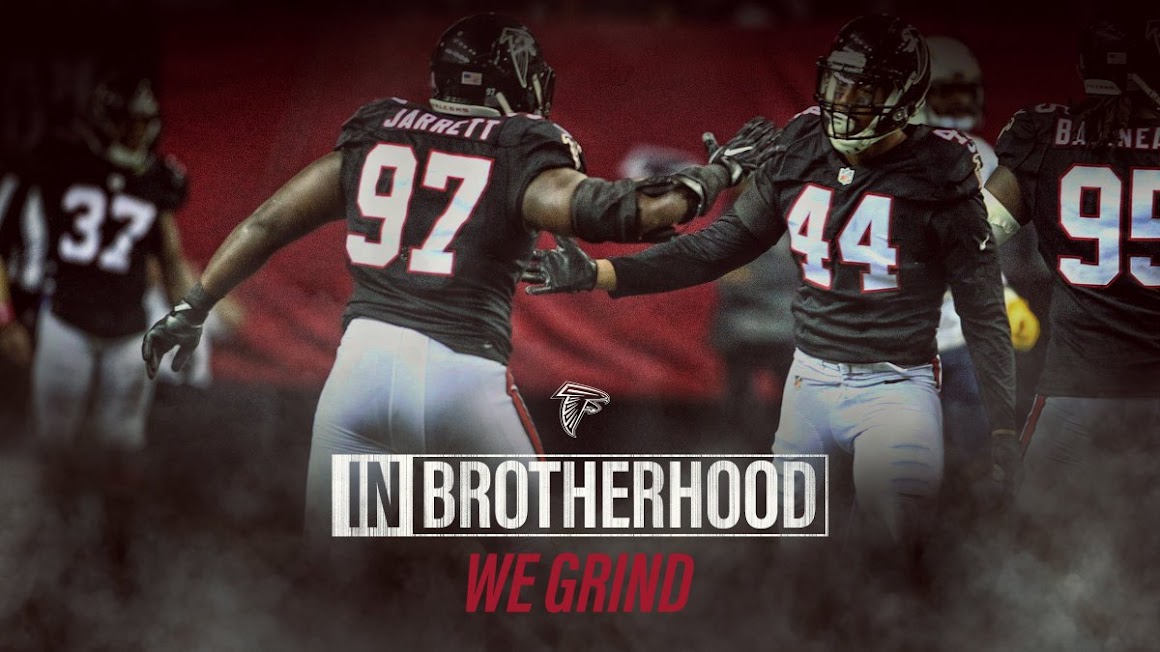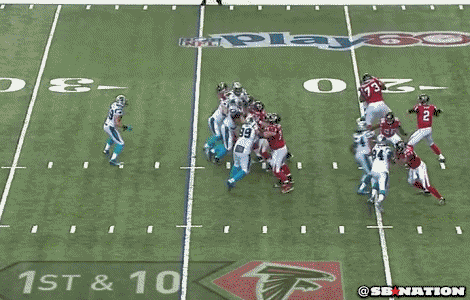How the 2016 Atlanta Falcons Offense was Built
Entering the 2016 regular season, the Falcons owned the NFL's toughest schedule as their opponents combined for a (.555) winning percentage in 2015. Atlanta's schedule consisted of facing the defending Super Bowl Champion Denver Broncos, two games against the defending NFC Champions and divisional rival, Carolina Panthers, and an Arizona Cardinals team that was the NFC's runner up. The Falcons also played other 2015 playoff teams such as the Green Bay Packers, the Seattle Seahawks and the Kansas City Chiefs.
After a disappointing Week 1 loss, there was very little enthusiasm on how the 2016 NFL season would go for the Atlanta Falcons. But how did they respond? By winning!
The 2016 Falcons established themselves as one of the NFC's elite teams, by finishing 11-5, winning their first NFC South title and clinching a playoff spot for the first time since the 2012 season. Additionally, Atlanta locked up a first round bye in a season many fans expected to be more developmental. However, the Falcons quietly developed in the past few years.
Over the past four seasons, the Falcons have re-tooled a roster that once boasted Pro Bowl players Roddy White, Michael Turner and Future Hall of Famer Tony Gonzalez. Although Julio Jones was on the 2011 and 2012 rosters, he wasn't truly considered Atlanta's top weapon at the time. After a 2013 season plagued with injuries, an aging roster and lack of depth, the Falcons would begin a three year process to return to a winning team.
During the 2013 season, the Falcons discovered two eventual contributors to the 2016 offense in fullback Patrick Dimarco and right tackle Ryan Schraeder, an undrafted player from Valdosta State University. Both players appeared in a few games during the 4-12 campaign.
Moving along, the building of the 2016 Falcons offense wasn't easy. Matt Ryan and Julio Jones were the two draft picks to make a game changing impact to the Falcons offense. Despite having a second tier quarterback and arguably the best receiver in football, the rest of the Falcons roster was depleted. In 2014, starting left tackle Jake Matthews was Atlanta's first selection in the NFL Draft out of Texas A&M. Also, eventual starting Pro Bowl running back Devonta Freeman was drafted in the 4th Round from Florida State University; however, this was a team with a bad offensive line and aging players such as Roddy White and Steven Jackson. They also lacked depth. In 2014, Ryan threw for 4,694 yards, 28 touchdowns, and 14 interceptions, and had a quarterback rating of 93.9; the second highest of his career; however, the Falcons finished 6-10. After the season, the Falcons fired head coach Mike Smith and offensive coordinator Dirk Koetter, which ushered another change in the offense for the next head coach. That man would be Dan Quinn, the former defensive coordinator of the Seattle Seahawks.
After Quinn officially became the head coach of the Falcons, Kyle Shanahan was hired. Shanahan, who was an offensive coordinator for the Houston Texans, Washington Redskins, and Cleveland Browns, would be up for a challenge in rebuilding a Falcons offense around Matt Ryan and Julio Jones. His desire was to bring a running game to an above average passing attack in Atlanta. In the draft, Tevin Coleman was selected in the third round from Indiana, Justin Hardy was selected in the fourth round from East Carolina University. During the off-season, the Falcons acquired starting right guard Chris Chester and tight end Jacob Tamme in free agency, the Titans traded left guard Adam Levitre to the Atlanta Falcons for a 2016 6th round draft pick.
As the Falcons continued rebuilding their roster in Dan Quinn's first year, the team got a small taste of success as the 2015 season kicked off to a surprising 5-0 start; however, the first year struggles began to appear. Although rookie running back Tevin Coleman began the season as the starter, he suffered an injury in week 2 against the New York Giants and second year back Devonta Freeman earned the starting nod. In his first career start, he had a breakout game against the league's #1 rushing defense in the NFL at the time, the Dallas Cowboys. Freeman rushed for 141 yards and 3 touchdowns on 30 carries. The next week, he rushed for 3 touchdowns against the Houston Texans. After posting another 100+ yard performance against the Washington Redskins, he solidified his spot as the starter.
After the 5-0 start, the issues began to pile up offensively, Atlanta had 30 offensive turnovers, third highest in the league, and didn't score more than 24 points in a game after Week 6. When Tevin Coleman returned, he was known for turnovers as his fumbling issues cost the Falcons some games. Outside of Julio Jones, the receiving core was ineffective and Matt Ryan posted his worst season of his NFL career. Ryan finished with 21 touchdown passes, the second lowest of his career, as well as 16 interceptions, the second highest of his career. Julio Jones had a monster season ended with 1,871 yards, a Falcons franchise record and the second-highest in NFL history, behind Calvin Johnson (1,964 receiving yards in 2012.) He also had a franchise record 136 receptions, tying with Antonio Brown for the most receptions that season. Devonta Freeman's breakout year ended with 1,634 all-purpose yards and 14 all-purpose touchdowns with 1,056 rushing yards and 11 rushing touchdowns, while also having 578 receiving yards and 3 receiving touchdowns. Although Freeman and Jones were Pro Bowl players, the Falcons finished 8-8 and entered the off-season looking to add more talent around these players.
During the off-season, Atlanta acquired center Alex Mack, as well as wide receivers Taylor Gabriel, Mohamed Sanu and Aldrick Robinson in free agency. Another weapon, tight end Austin Hooper from Stanford, was drafted in the third round of the 2016 NFL Draft. Entering the season, many wondered how the Falcons offense would perform and fans were in for a pleasant surprise.
This season, the Atlanta Falcons finished with 540 points, tied with the 2000 St. Louis Rams as the seventh highest scoring team in NFL History; and finished with an average of (33.8) points per game, also the seventh highest scoring average in league history. Atlanta's offense finished first in scoring, second in offensive yards, first in offensive turnovers (11), third in passing yards (4,725), second in passing touchdowns (38), and first in net yards per pass attempt (8.2 yards per game). In rushing, Atlanta finished fifth in yards (1,928), third in touchdowns (20), and fifth in rushing yards per attempt (4.6). Believe it or not, we just witnessed one of the greatest offensive outputs in league history!
Matt Ryan posted an MVP caliber season in 2016 as he set a new Falcons single-season mark with 4,944 passing yards. Ryan also posted 38 touchdowns and just seven interceptions, both career bests. He also completed 69.9 percent of his throws which was good for third overall. Furthermore, Ryan posted the fourth highest passer rating in NFL History with (117.1) and became the first quarterback to throw a touchdown pass to 13 different receivers. Unlike previous years, Atlanta's depth was a huge benefit as players such as Taylor Gabriel, Aldrick Robinson, Levine Toilolo and others contributed in Atlanta's offense. The most notable game of the 2016 season was the Week 4 victory against the Carolina Panthers as Matt Ryan and Julio Jones set Franchise records and posted some of the best numbers in NFL History in a single game. Matt Ryan went 28-of-37 for 503 yards and 4 touchdowns, while Julio Jones posted 12 catches for 300 yards, and one touchdown.
Devonta Freeman posted another Pro Bowl season with 1,079 rushing yards, 11 rushing touchdowns, 54 receptions, 462 receiving yards, and two receiving touchdowns. Tevin Coleman, who struggled during his rookie season, made a huge impact in Atlanta's offense as he posted 520 rushing yards, 8 rushing touchdowns, 421 receiving yards, and three receiving touchdowns as the tandem of Coleman and Freeman is arguably the best in the NFL. Julio Jones earned another Pro Bowl appearance as he posted 83 receptions, 1,409 receiving yards, second in the league behind T.Y. Hilton of the Indianapolis Colts, and six receiving touchdowns.
Atlanta got a huge boost from slot receiver Taylor Gabriel as he posted 579 receiving yards and six touchdowns in 13 games of action this season. Gabriel became a key playmaker in the second half of the Falcons season. Also, Mohammed Sanu posted 59 receptions, 653 receiving yards, and four touchdowns, including catching the game winner against Green Bay in a 33-32 victory. Gabriel and Sanu were major additions to the Falcons offense. Alex Mack provided a major upgrade to the Falcons offensive line as he finally provided Matt Ryan the protection he's missed since the retirement of Todd McClure after the 2012 season.
In conclusion, the Falcons went through a three year rebuilding process to build the NFL's best offense of the 2016 season. Although there are many things left for this unit to accomplish in the NFL Playoffs, it was a pleasure to take a look at their historical season. Atlanta fans, we will tell future generations about this offense whether they end with a Lombardi Trophy in Houston a month from now or not!
Nathan Butler Jr. (@ATLSportsNate)













No comments:
Post a Comment